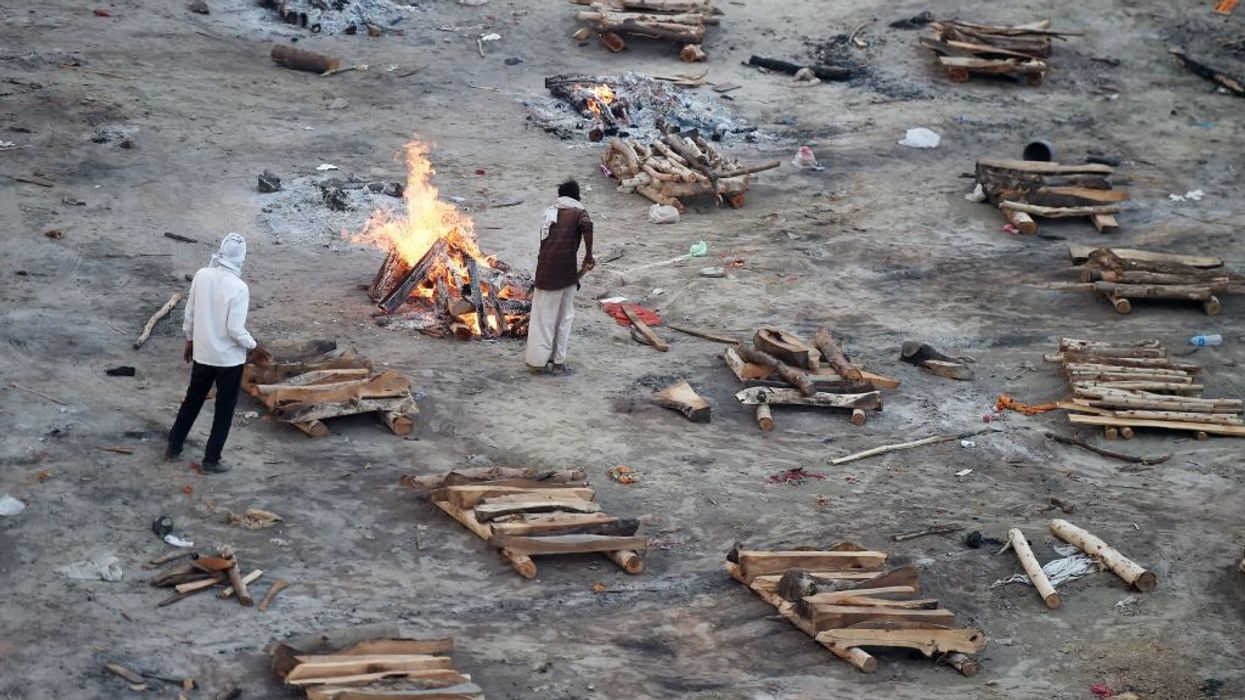BANGLADESH on Thursday (6) handed over 10,000 vials of antiviral injection Remdesivir to India as part of its medical assistance.
Bangladesh's deputy high commissioner in Kolkata Toufique Hasan handed over 10,000 vials of Remdesivir to the representative of the Indian government at the Indian border port of Petrapole.
These 10,000 injections manufactured locally were sent as medical assistance on behalf of the people of Bangladesh at the instruction of prime minister Sheikh Hasina for the Covid-affected people of India, according to an official statement.
This was the first consignment of medical assistance by Bangladesh.
A record 412,262 new cases and 3,980 deaths were reported over the past 24 hours in India, taking total infections past 21 million and the overall death toll to 230,168, health ministry data showed.
Last week, Bangladesh had offered to send emergency medicines and medical equipment supplies to India to combat the massive surge in coronavirus cases.
The supplies include about 10,000 vials of injectable anti-viral, oral anti-viral, 30,000 PPE kits and several thousand zinc, calcium, vitamin C and other necessary tablets.
"Bangladesh stands in solidarity with its close neighbour India at this critical moment and Dhaka is ready to provide and mobilise support in every possible way to save lives there," the foreign ministry said in a statement.
"The Government of Bangladesh expresses deep sorrow and condolences at the loss of lives in India due to the recent spread of the Covid-19 pandemic."
Over 40 countries have committed to provide India urgently required medical supplies like oxygen-related equipment and critical medicines to help it deal with an unprecedented second wave of the coronavirus pandemic, foreign secretary Harsh Vardhan Shringla said in New Delhi last week.
Victoria state's aid
The Australian state of Victoria on Thursday announced 41 million Australian dollars ($32m) worth of aid and medical equipment, including 1,000 ventilators, for India.
The donation will be made to the Commonwealth medical stockpile.
"We are working with the Department of Foreign Affairs and Trade (DFAT) to deliver this support to India as the country works to manage the second wave of coronavirus and treat those infected," according to an official statement.
"The 1,000 ICU Ventilators are currently owned by the Department of Health and will be donated to India for humanitarian purposes and the state was also preparing to send a range of supporting equipment like connectors and humidifiers, with the total package valued at $32m," said the state's acting Premier James Merlino.
''The situation in India right now is devastating and shows that the fight against this pandemic is not over – we have a responsibility to help where we can and that's exactly what we're doing," said minister for multicultural affairs Ros Spence.
''Our thoughts are with everyone impacted by this unfolding tragedy and we hope this package will go some way to addressing the challenges India is facing right now.''
Expressing solidarity with India and the people, Kaushaliya Vagghela, the first Indian born MP elected to the Victorian Parliament, said: "At this painful and difficult time, all Victorians stand side by side with our Indian community, both here and abroad. I stood up in Victorian Parliament to urge the federal government to explore all options possible to safely bring back Australians currently in India."
Victoria has the highest number of migrants from India followed closely by New South Wales.
Italian aid
A medical oxygen generation plant, which has been sent by Italy to tackle the Covid-19 health emergency in India and can support 100 patients at one time, was operationalised at a Central Armed Police Forces (CAPF) hospital in Greater Noida on Thursday.
The machinery for the plant was brought to the country onboard a special flight few days back and the centre had deployed it at the CAPF referral hospital that is operated by the Indo-Tibetan Border Police (ITBP).
"Italian Ambassador to India Vincenzo De Luca switched on the plant at a ceremony that was attended by senior ITBP officers.The plant has been installed and made operational at the hospital campus within 48 hours," a spokesperson for the border guarding force said.
It will supply medical oxygen to more than 100 Covid-19 beds available at this hospital, he added.
The CAPF hospital primarily caters to the personnel of various police and paramilitary organisations, their families, veterans of these forces that function under the command of India's home ministry.
Ambassador Luca spoke at the event and said the plant will be at this hospital 'permanently' and it was a sign of friendship and solidarity between the two countries.
He also recounted how some Italian tourists (about 17) in India were treated by the ITBP medical setup when they contracted the coronavirus infection last year.
"We do not forget this (gesture by India)...this friendship and solidarity with India will continue...," he said.
Senior ITBP officers present on the occasion said the government and people of India have 'big gratitude' for the humanitarian gesture shown by Italy.





